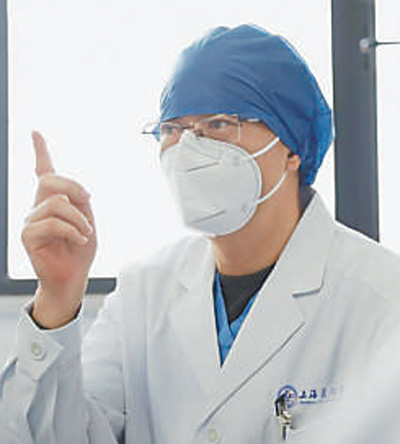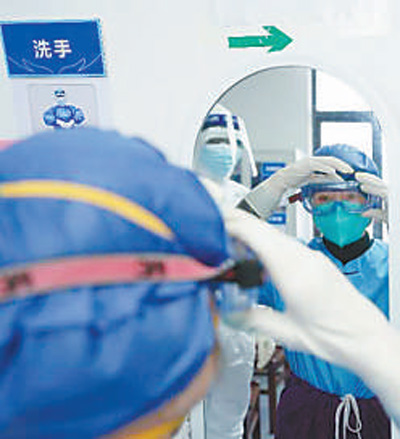

More than 4,000 military medics have come to Wuhan, central China’s Hubei province, to fight the novel coronavirus in the front line, with the following three medical workers as a mirror of the efforts the special group has made.

Xie Weifen (Photo/Cao Xi)
Xie Weifen, from the second affiliated hospital of the Second Military Medical University, volunteered to go to Wuhan to fight against the novel coronavirus after the pneumonia outbreak. “I won’t be worthy of the name as a military doctor if I don’t volunteer to go to the battlefield,” he said.
While making the rounds of the wards in the Hubei Maternity and Child Healthcare Hospital, Xie would ask the doctors in charge of the patients questions to check if they are familiar with the conditions of the patients, such as their blood glucose and pressure.
He was once spotted by his coworker Zou Zui standing beside a hospital bed and counting the drips of the infusion per minute just to make sure the speed meets the demand of the treatment. “Even trivial details about the patients are very important,” he said.
The Huoshenshan hospital in Wuhan received the first batch of 50 pneumonia patients on Feb. 4, 24 of whom were sent to the ward that Zhao Yuying directed.

Zhao Yuying (Photo/Liu Huibin)
As the patients were a little anxious, Zhao, who has come to Wuhan from the Bethune International Peace Hospital, created a WeChat group on the social network platform where the doctor would answer the questions of the patients so that they could feel more secure. Each day, Zhao may send several hundred messages to the patients in the WeChat group, short or long.
By now, over 100 pneumonia patients in the ward have been cured and discharged, yet many of them would still cheer on other patients in the WeChat Group. Zhao and other medical workers also intend to help the patients with recovery through the platform after they leave Wuhan when the epidemic is curbed.
Li Xiaoli from a hospital under the Rocket Force of the People’s Liberation Army has become the head nurse of a division of infectious disease under the Hubei Maternity and Child Healthcare Hospital after the pneumonia outbreak.
Li has been in the military for 31 years and devoted herself to clinical care for 26 years. She volunteered to help the Wuhan people even though she had applied for retirement.

Li Xiaoli (Photo/Zhao Fasheng)
Oldest as she may be in the division, she works very hard. “Once she puts on the protective clothing, it feels like she was charged up and full of energy,” said Qiao Huixia, who has worked with Li for 13 years.
Li encourages the nurses to call the patients in a genial way instead of by their patient numbers, a habit that she has stuck to for over 10 years. “She calls us as if we are like families,” said one of the patients of Li.
 Fire brigade in Shanghai holds group wedding
Fire brigade in Shanghai holds group wedding Tourists enjoy ice sculptures in Datan Town, north China
Tourists enjoy ice sculptures in Datan Town, north China Sunset scenery of Dayan Pagoda in Xi'an
Sunset scenery of Dayan Pagoda in Xi'an Tourists have fun at scenic spot in Nanlong Town, NW China
Tourists have fun at scenic spot in Nanlong Town, NW China Harbin attracts tourists by making best use of ice in winter
Harbin attracts tourists by making best use of ice in winter In pics: FIS Alpine Ski Women's World Cup Slalom
In pics: FIS Alpine Ski Women's World Cup Slalom Black-necked cranes rest at reservoir in Lhunzhub County, Lhasa
Black-necked cranes rest at reservoir in Lhunzhub County, Lhasa China's FAST telescope will be available to foreign scientists in April
China's FAST telescope will be available to foreign scientists in April "She power" plays indispensable role in poverty alleviation
"She power" plays indispensable role in poverty alleviation Top 10 world news events of People's Daily in 2020
Top 10 world news events of People's Daily in 2020 Top 10 China news events of People's Daily in 2020
Top 10 China news events of People's Daily in 2020 Top 10 media buzzwords of 2020
Top 10 media buzzwords of 2020 Year-ender:10 major tourism stories of 2020
Year-ender:10 major tourism stories of 2020 No interference in Venezuelan issues
No interference in Venezuelan issues
 Biz prepares for trade spat
Biz prepares for trade spat
 Broadcasting Continent
Broadcasting Continent Australia wins Chinese CEOs as US loses
Australia wins Chinese CEOs as US loses